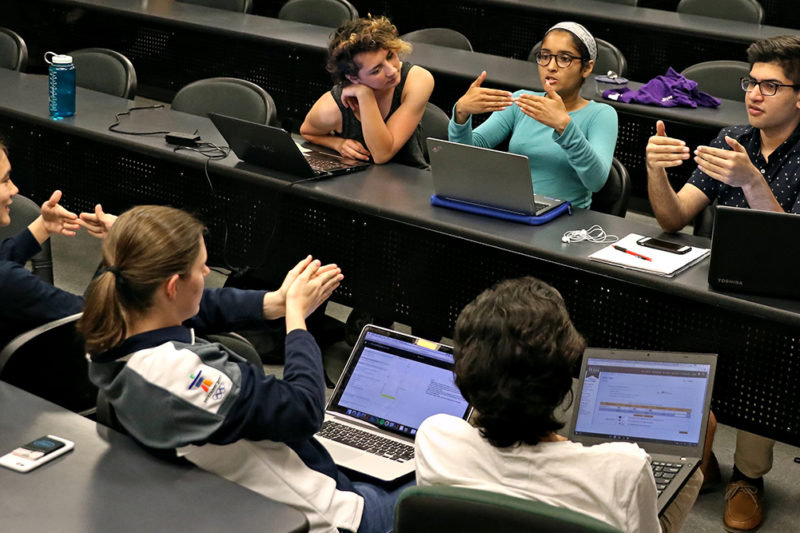Online Communication Kick-Starts a UT Project in a South Indian Village
By Hailey Becker
Reporting Texas

Engineering and social work students at the University of Texas at Austin sometimes work online with counterparts in India as they plan construction of a community center there this summer. Joshua Guerra / Reporting Texas
University students have traveled overseas for decades to help build schools, churches and other facilities for underserved communities. They still do, but now technology allows them to get the work going long before anyone clears an airport security checkpoint.
At the University of Texas at Austin, eight engineering and social work students have been at work since last fall on a community center in Packianathapuram, India, a village of 75 families in India’s southernmost Tamil Nadu state. Team members communicate with village leaders electronically to keep the project on track. In May, the team will travel there to help villagers complete the structure.
“Technology has definitely connected us in a way that is very powerful and allows us to do these projects,” Janet Ellzey, a mechanical engineering professor and vice provost for international programs, said in an interview. “We could not do this without Skype, without cellphones, without email.”
The India work is part of UT’s Projects With Under-Served Communities program, which Ellzey founded in 2010. Previous projects have been completed in Peru, Ghana, Costa Rica, Nicaragua, Guatemala, Tanzania, Papua New Guinea and India. Students raise the money through crowdfunding and other donations. They pay for their own transportation.
“Team India,” as the group calls itself, raised more than $18,000 from 179 donors, according to UT’s “Hornraiser” crowdfunding site. Two similar projects are underway this year at UT: a potable-water system for a town in Thailand, and solar power for a clinic in Guatemala.
Anna Wittenmyer, a 22-year-old civil engineering major from Houston and the team’s manager, said being able to communicate by Skype helped the UT students design the center the village needs.
Packianathapuram community leaders initially requested a fitness center for youth.
“It was such a specific request, and we were nervous about building it,” Wittenmyer said in an interview, “because what if they don’t need a fitness center three years from now and instead need a school?”
Skype conversations revealed that leaders actually wanted a more flexible building for community meetings, after-school activities and educational programs on drug and alcohol abuse, she said. The students meet with community leaders often to keep the project focused.
“Usually they are sitting in plastic chairs in a circle under a big tree where they meet,” Wittenmyer said. “We talk to them about the project, ask questions we have for them, talk about their concerns and hopes, see if they have any questions for us.”
Packianathapuram has electricity but no internet, so technology has been a challenge, as has language, since no one in the village speaks English.
The solution has been Paul Louther and his smartphone, which becomes an internet hot spot for the Skype sessions. Louther works for CASA, an Indian development and humanitarian organization, and serves as Team India’s translator and onsite coordinator.
Abdullah Alqaroot, 25-year-old UT engineering graduate and Austin consultant, said in an interview that the Projects With Under-Served Communities program has improved since 2014, when his team traveled to Nicaragua, and that technology has played a big role. Teams are using more advanced design software, he said, to prepare projects such as Team India’s.
“Team India is way more ahead than we were,” Alqaroot said.
Alqaroot still consults with student teams on new technology and software, and has set up an alumni network for people who worked on projects.
Ken Hanks, a local engineer and technical adviser to the underserved communities program, will accompany Team India to Packianathapuram.